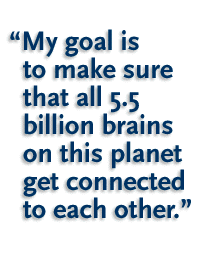 mong the characters who loom the largest in cyberspace is a man in a Stetson hat, cowboy boots, and a white goatee who wields his laptop "equalizer" like a vigilante's six-shooter. Dave Hughes, a retired U.S. Army colonel, won medals in Korea and Vietnam and taught General Norman Schwartzkopf a thing or two at West Point.
mong the characters who loom the largest in cyberspace is a man in a Stetson hat, cowboy boots, and a white goatee who wields his laptop "equalizer" like a vigilante's six-shooter. Dave Hughes, a retired U.S. Army colonel, won medals in Korea and Vietnam and taught General Norman Schwartzkopf a thing or two at West Point. Now Dave is fighting to provide Internet access to everyone, everywhere. "My goal is to make sure that all 5.5 billion brains on this planet get connected to each other," he says. His untiring campaign has made the self-styled "Cursor Cowboy" a well-known character in the online world.
Reared in the prairie town of Colorado Springs where he lives today, Dave, 68, takes to heart the concerns of the working class, migrant farmworkers, and Native Americans. If it's available to everyone, he believes, electronic communication can narrow the gulf between rich and poor. "I spend time figuring out how to connect up -- at the lowest possible cost and the highest level of connectivity -- the most remote, rural, disadvantaged communities, schools, and enterprises," says Dave.
After leaving the army in 1973, Dave turned his attention to cyberspace, establishing Colorado's first bulletin board system (BBS) in 1980. He named it "Rogers Bar" after Rogers Frontier Bar, an old local cowboy watering hole. Dave wired the bar to the Internet, offering online access to anyone who frequents it. The Cursor Cowboy himself often holds forth from a stool at the bar, when he's not traveling to places such as Russia and Turkey on his mission of electronic evangelism.
In 1982, after learning that the local planning commission was attempting to restrict the business use of private homes, Dave Hughes proved the political power of the new medium. Feeling strongly that people should be allowed to earn a living from their home offices, Dave typed the text of the proposed ordinance, posted it on the BBS, and asked for comments. The 250 citizens who responded forced the council to modify the proposed law. Through the bulletin board, Dave went on to help elect a city council member and oust a county commissioner. The council quickly established a bulletin board of its own.



